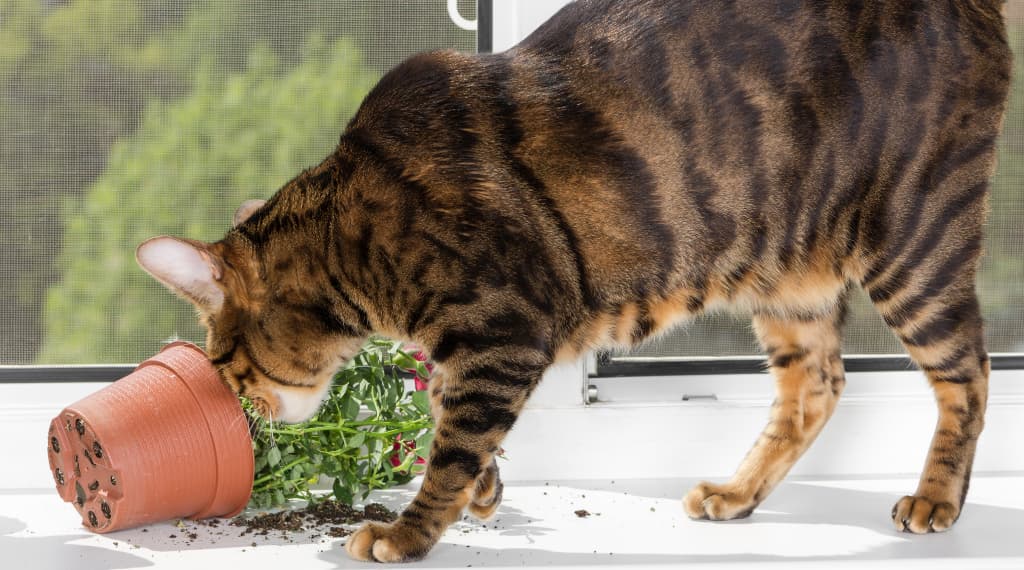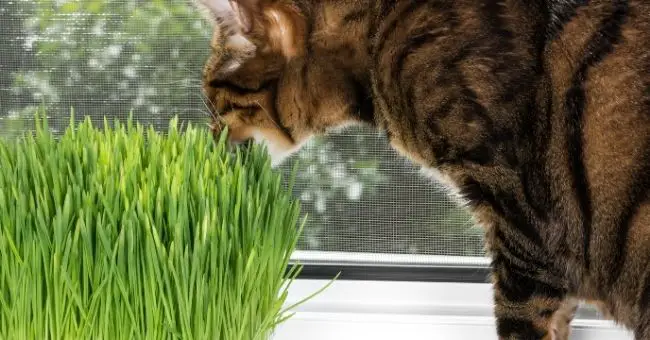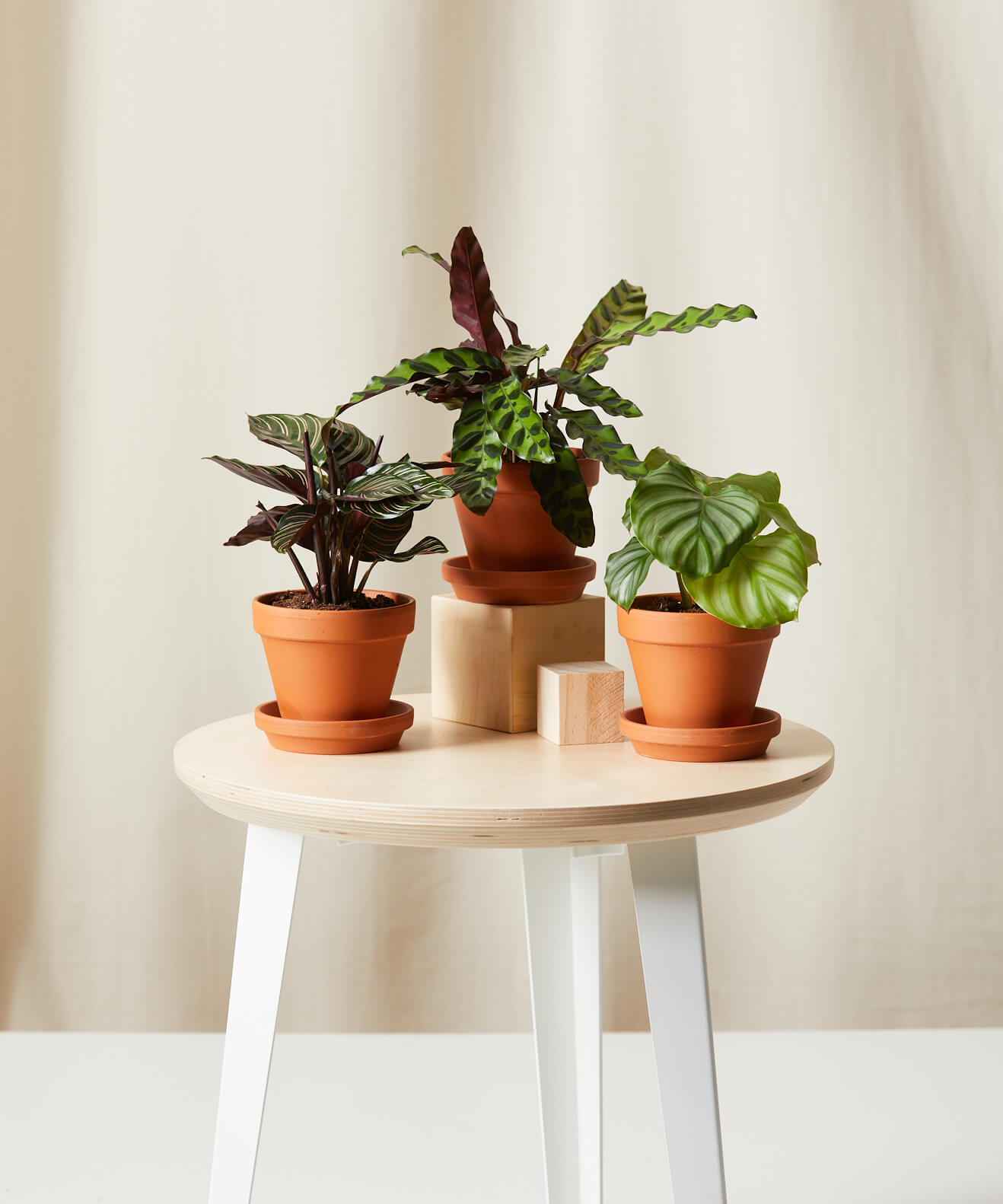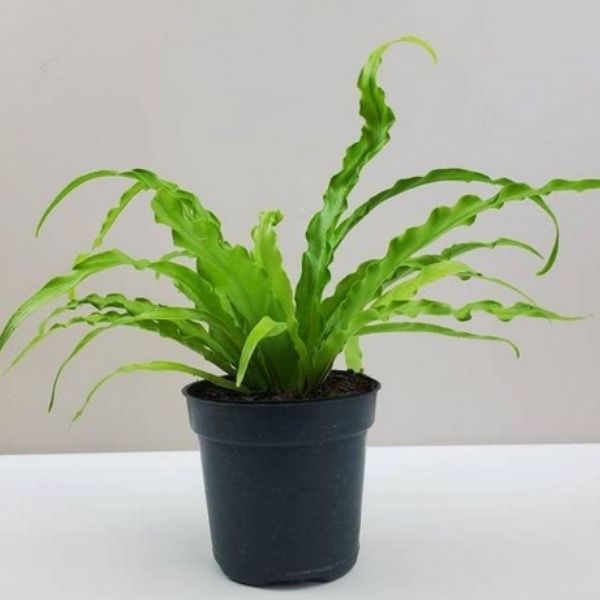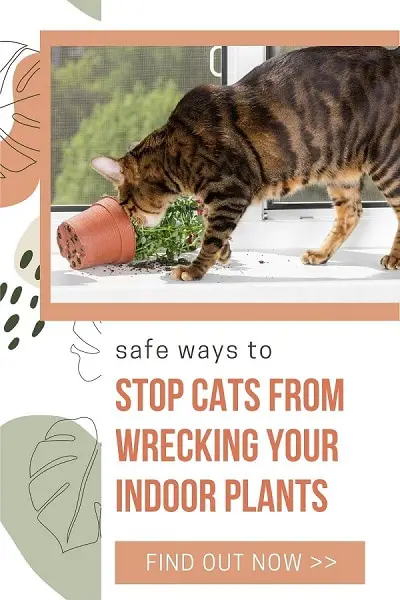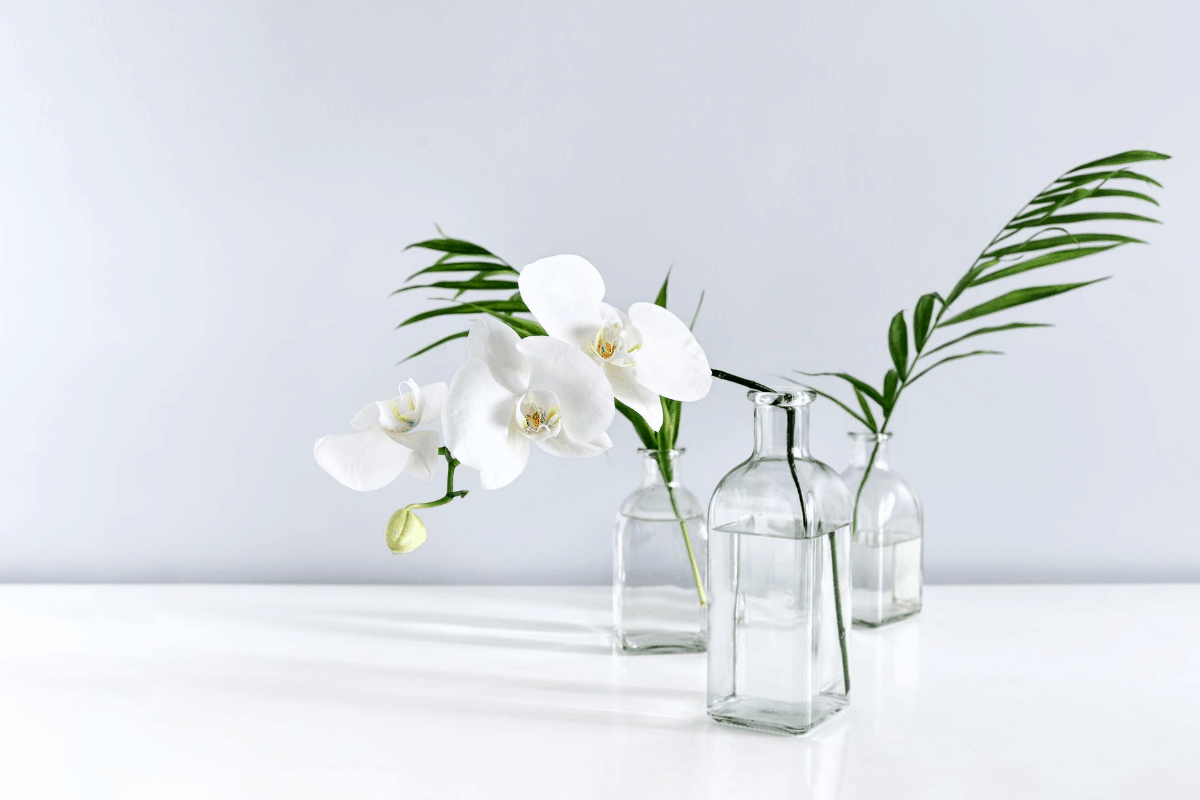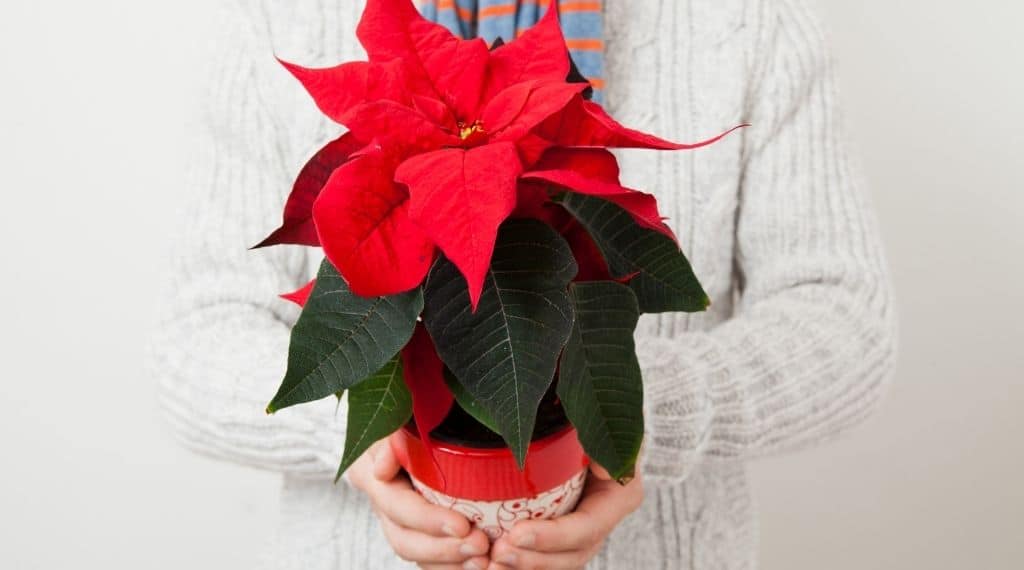Last Updated on October 5, 2021 by Plantiful Interiors
How to Cat-Proof Your Houseplants
Plants are a great way to brighten up a home and let nature in. However, if you own a cat, chances are they see your plants as a play toy or a snack. This article will help you learn how to keep cats out of house plants so you can stop cleaning up messes and replacing plants your cats destroy and can start enjoying having both cats and plants in your home.
This site features affiliate content. As an affiliate partner of various brands, we earn commissions on qualifying purchases, at no extra cost to you. Please read our disclaimer for more information.
What do you do when your cat won’t leave your houseplants alone?
You can cat-proof your houseplants or keep your houseplants safe from your cat by:
- Making the plant itself unappealing to them – use scents like citrus, banana or apple cider vinegar
- Giving them their own cat grass or another safe plant alternative
- Moving plants so that they cannot reach them
- Training them to ignore the plants
Now, let’s get into detail on each of these solutions. We will also tackle related topics such as whether or not houseplants are toxic to cats and if felines can actually destroy these lovely decorations. If you’re looking for peaceful coexistence between your furry friends and leafy housemates, read on.
Why Is My Cat Eating My Houseplants?
Before diving into different ways of how to keep cats out of house plants, it’s important to take a look at the reasons why your cat is eating your potted plant to begin with.
If you have been a long-time cat owner, you may have noticed that your furry friend loves to chew on the leaves of your indoor plants. Cats will eat your houseplants for one or several of the following reasons:
- Relief from tummy troubles. It may help them feel better if they are experiencing gastrointestinal issues by inducing vomiting or giving them something to help them feel full
- Vitamin deficiency. They enjoy the texture of the plant, and it may provide them with vitamins and minerals that they are missing from their all-meat diet
- Stress relief. Your cat is using the plant as a coping mechanism for stress.
These reasons make sense, but it is also important to stop cats from chewing your houseplants if it becomes a bad habit and they eat large portions. Too much plant matter in the gastrointestinal tract can cause digestive problems since cats don’t have the proper enzymes to digest it.
How To Deter Cats from Chewing Your Plants
Odds are, your cat isn’t maliciously destroying your plants; it’s using them to address some kind of issue.
If you see this behavior a lot, bring your cat to the vet to make sure you aren’t dealing with an intestinal parasite, gastrointestinal problem, or vitamin deficiency.
No matter what the reason, if you want to have houseplants and cats, you’ll need to change this unwanted kitty behavior and save your plants.
Top 6 Ways to Break Your Cat’s Houseplant Chewing Habits
Some of the best ways to prevent cats from eating houseplants include:
- Aversion. Make the plant or the pot smell like something cats don’t like, such as citrus.
- Relocation. Place the plant in a hanging planter or other out-of-reach location.
- Change plants. Choose plants your cat won’t like, such as roses or cactus.
- Catnip. Give them their own safe plant to do whatever they like with.
- Spray the plants. Use a water and vinegar solution on the plant.
- Good, old-fashioned training. Teach your cat to leave the plants alone.
Let’s dive into each of these in more detail.
Make the Plant Unappealing To Your Cat With Various Scents
One of the best ways to keep cats out of house plants is by adding scents to make them unappealing. A cat’s sense of smell is more powerful than a human’s sense, thus causing some scents more intense. Scents that might be nice to humans can be irritating to cats.
Some of the scents you can add to a plant include:
- Citrus; you can add juice from the flesh of a citrus plant here
- Rosemary or thyme
- Mustard seeds
- Banana; you can grind the banana fruit and spread it around the plant
- Cinnamon, curry, and other non-pepper items that produce spicy scents
- Mint, menthol, and other mint-like items
All of these scents are safe for cats, as they will not cause any physical issues. They will simply be extremely bothersome and temporarily unappealing.
Some cats may still try to chew on a plant, but the irritating flavors they’ll come across will deter them from trying once again later.
There are a few scents you should also avoid:
- Avoid items that may trigger negative reactions like rue, geranium, lavender, and eucalyptus. These may produce negative skin reactions.
- Do not use cayenne pepper or any pepper-based items.
- Do not use the skins of citrus plants, as they can trigger vomiting.
Plant Care Tip: If you spray anything on the leaves of your plant, ensure that it is not placed where in direct sunlight or the leaves could burn. Wet or damp leaves (from spray) are more susceptible to being damaged.
Give Your Cat a Safe Plant Alternative
Cats tend to chew on and eat house plants because they like their tastes, plus they like the texture. The texture can be appealing and easy for the cat to consume.
Cats also attack and eat plants because they are instinctual hunters who will target and strike anything that moves, even if it’s a house plant. Some cats may also chew plants because they are bored.
Giving your cat a safe alternative will be ideal for protecting your cat and your plants. You can plan a small cat grass bed inside your house. The cat grass space can feature barley, wheat, or rye-based grass seeds.
These grasses are safe for your cat to consume, but you should still watch how much they consume at a time. Talk with your veterinarian before planting cat grass to see if these items are safe for your cat.
Move Plants to Unreachable Spaces
Another solution is to move plants to spaces that are hard for cats to reach. Whether it’s a shelf that a cat cannot leap onto to (does such a thing even exist? cat’s are brave) or a designated plant room where the door is kept close.
One of our favorite ways to keep plants out of a cat’s reach is to use hanging planters. Again, make sure the basket is hung in an area that can not be reached by your cat, don’t hang it directly beside a tall shelving unit your cat can climb.
Check out this article for a list of our top hanging planters, there’s something here for every type of decor…and very affordable prices. We’ve also included a few of our favorites below.
Train Your Cat To Ignore Your Indoor Plants
As for training, with most cats, giving them a safe version of what they want can do the trick.
Since the movement of the plant leaves can remind cats of their hunting instinct, you may want to find ways to encourage natural hunting behavior while keeping your plants safe.
This interactive cat toy with feathers and bells is a great distraction from your plants. If you catch your cat nibbling on your houseplant, use the remote control to guide this toy to them to get their attention and draw them away from your plant.
Here are a few other ideas from cat owners on how to train your cat to leave your plant alone:
- Leash training is useful for wide-open rooms. You can train your cat to learn how to avoid walking towards specific plants by controlling the cat through a gentle leash. Do not be overly abrasive with the leash.
- You can train a cat to learn how to walk away from a plant as necessary, providing them with treats every time your cat avoids the plant in question.
- You can provide toys in areas near plants to keep your cats from thinking about those plants.
Use a Repellent Spray
The last part of how to keep cats out of house plants is to use a safe repellent spray. You can add a spray that will keep a pet out of an area when it gets in a space.
The PetSafe SSSCat motion-activated pet repellent spray is one useful choice. The spray activates when your cat is within three feet of the space. It produces an odorless spray that does not harm your cat, but it will trigger an uncomfortable sensation.
The Bodhi Dog Not Here Spray (though advertised for dogs, can be used for cats) can also help prevent your cat from using the soil in your plant pot as a litter box. It does not contain any chemicals so will not damage your plant and it trains cats to both avoid chewing plants and marking their territory.
How to Stop Cats From Digging in Houseplants
Another activity cats enjoy doing with plants, especially if they are potted, is digging in the soil that surrounds them. Cats love to scratch and paw at things, so digging seems like a natural fit with these behaviors.
The other reason cats dig in houseplants is that soil looks similar to cat litter, so they think it is another place for them to use the bathroom.
Some ways to discourage your cat from digging in plant soil are:
- Create a barrier around the plant so that it is hard for them to get in the pot to dig
- Cover the soil with rocks or mulch so that the cats become uncomfortable when they try to dig
- Place skewers in the soil so that the cat cannot fit their paws inside to dig
- Surround the plant with plastic cups or other safe things that will scare the cat when they try to reach the plant
Again, digging is instinctual, so you may want to provide them another safe and un-intrusive place to dig that is away from your plants and doesn’t involve dirt, like a cat activity center or peek-a-boo box.
Both the eating and digging solutions provide effective ways to make sure your felines stay away from plants. Let’s look at some other aspects of the cat and plant relationship.
Can Cats Destroy Houseplants?
Based on the previous sections, we know that felines can tamper with houseplants and chew on the leaves for fun, but can they actually kill or destroy them?
The short answer is yes.
Cats can ruin houseplants by knocking over the pots or by slashing the leaves with their claws. They can also dig the plant up out of the soil from too much digging, cutting the plant off from their nutrient supply and killing them. However, the vast majority of cats will only play with them here and there out of curiosity.
Are Houseplants Toxic to Cats?
Yes, some houseplants are toxic to cats. You should always do your research before bringing any new plants home if you have any type of pet or small children in the house.
Some of the most common house plants you should avoid include:
- Snake plants
- Spider plants
- ZZ plants
- Pothos
- Fiddle Leaf Fig
- Aloe Vera
- Succulents
That said, not all houseplants are toxic to cats. We have compiled a post of houseplants that are safe for felines. However, the ASPCA has a whole glossary of plants, both common and not, that are considered poisonous to cats.
If you are looking for cat-safe plants, check out our 7 Cat Friendly Indoor Plants (that are also easy to grow) for houseplant that won’t hurt your kitty.
Here’s a few cat friendly plants to get you started:
Symptoms of Poisoning or Toxicity in Cats
Cats exhibit many symptoms that owners should be on the lookout for in the event they may have been poisoned, including:
- Salivation
- Twitching
- Difficulty breathing
- Swelling or inflammation of the skin
- Not drinking or eating regularly
The more of these symptoms your cat is presenting, the more serious their case is likely to be. Be vigilant and watch your cat’s behavior if you suspect they have been poisoned
What Should I Do If My Cat Has Ingested a Toxic Plant?
If the symptoms are at an early stage, call the ASPCA poison control hotline at 888-426-4435. An expert can help you manage your cat’s symptoms and decide if or when they need to visit the vet. Once you have done this, phone the vet and inform them of the situation, and if it has been more than two hours since the incident, take them to the emergency room
Before buying a plant for your home, it is in your best interest to see if it is safe for your cat. After all, the natural curiosity cats have can lead to some sticky situations. Taking this step will help cat owners avoid those dreaded emergency vet bills.
Summary
There are many ways to protect your house plants from your cats, as well as to keep your house safe from them. Do your best to research plants before bringing them home, and have a plan in place if you know that it is going to be difficult to keep your cat away. If things do go awry, always consult your vet. Following these tips will make having houseplants with cats much easier.
How to keep cats out of house plants
Pin for later

